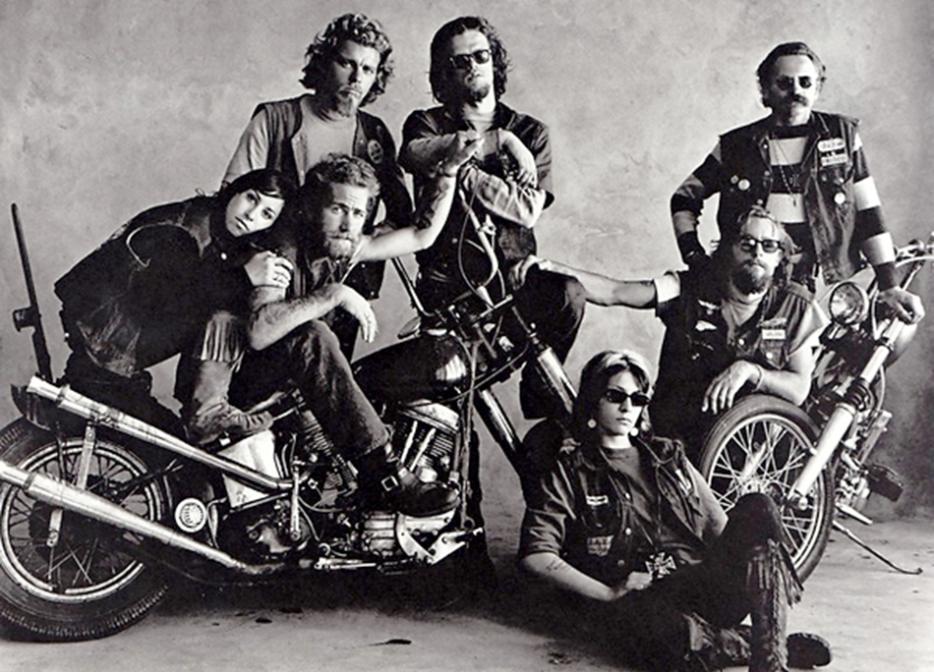Boy Scouts get merit patches for knot tying, semaphore and other crafts. At one field day, the Satan’s Choice awarded Campbell a patch on his club vest for performing cunnilingus on a menstruating woman (a red wing patch) and another for having sex with a woman with a sexually transmitted disease (green wings). Campbell scored a biker’s daily double of sorts that day, getting both his patches from contact with the same woman at the same party. To make it official, the event had to be witnessed by a club member, much like the Guinness Book of Records needs an official spotter before recording an achievement in its books. With that accomplished, Campbell declined to go further in his patch earning and didn’t seek purple wings, for sex with a dead person—not that there was a corpse available anyway. “The other ones are just too weird for me. I never saw anybody wear a purple patch. Nobody in Canada ever did. There was a white patch for sex with a virgin. I never saw that either.”
When it came to their treatment of women, Campbell was actually disgusted at the conduct of some clubmates back in the 1960s and 1970s. He remains troubled by the memory of how young girls would show up at biker clubhouses as if expecting some sort of protection. If a girl looked too young, Campbell says he would give her a stern fatherly lecture. “I’ve sent many underage girls home in cabs.”
Plenty of women willingly arrived at biker clubhouses, eager to party with the bad boys. One of the wilder biker parties of the 1970s was in the apartment of an Oshawa woman who had a framed eight-by-ten photo of her father on top of the television in the living room. What made the photo stand out was that her father was wearing a police uniform. It wasn’t until later, when evidence was revealed at a biker trial, that Campbell learned that the orgy had been electronically recorded by police, and that the officers who listened in on the bacchanal included the woman’s father. It might break another man to listen to his daughter in mid-orgy with a biker gang while flanked by his peers. However, the father in the pic- ture that watched down from his daughter’s television was nothing if not zealous, and he rose high in policing after the incident. “They [police] call us sick. What would the other cops think? And we’re the bad guys? Holy cow! Think moral. To bug your daughter, that’s mind-boggling. Did his wife know? There’s a thousand questions there.” As Campbell sees it, much of the tension between police and bikers came from jealousy. “We’ve been with the nicest broads, we’ve partied heartier, and these cops sit there for days [in surveillance] just watching.”
Campbell had an extremely low sperm count because of a case of mumps he contracted as a child, which made him doubt several claims that he made women pregnant in these late-night romps. “I’ve had four or five girls blame me for being the father. I just smiled at them.” There were other stories about women that he didn’t doubt, although they made his head spin nonetheless. “I heard a guy blindfolded his girl—a dancer— every night when he took her home. I asked him why he does it. He says, ‘Yeah, I don’t want her to know where I live.’ Like it was normal.”
One good spot for bikers to meet women was the bar of the Genosha Hotel on King Street East in Oshawa’s downtown core. In Marvel comics, “Genosha” was a make-believe land populated by mutants that devolved into a full-fledged disaster zone. In Campbell’s day, the real- life Genosha wasn’t much different. It hadn’t always been this way. The Genosha was conceived as an impressive place to house visiting auto executives and salespeople, and its name was a combination of “General Motors” and “Oshawa.” Opened in 1929, it never rebounded after the stock market collapse later that year. Rescued from bankruptcy in the Great Depression by local notables, it was still grand enough that Queen Elizabeth, the consort of George VI, stayed there for a night in 1939.
Campbell had an extremely low sperm count because of a case of mumps he contracted as a child, which made him doubt several claims that he made women pregnant in these late-night romps. “I’ve had four or five girls blame me for being the father. I just smiled at them.” There were other stories about women that he didn’t doubt, although they made his head spin nonetheless. “I heard a guy blindfolded his girl—a dancer— every night when he took her home. I asked him why he does it. He says, ‘Yeah, I don’t want her to know where I live.’ Like it was normal.”
Over time, however, furnishings were stripped and the once stately Chicago Style, art deco–influenced hotel was converted into a rooming house while the basement became a low-end strip club. The Genosha had been a rock-bottom dive for quite some time when Campbell and his friend Smutley arrived for a drink one afternoon in the late 1970s and overheard two men at a neighbouring table boasting that they were members of the Satan’s Choice. It was clearly a ruse designed to impress a pair of nearby women. Worse yet, it appeared to be working, as if the imposters were writing a cheque on funds that weren’t even theirs.
“The broads are going to go with them,” Campbell recalls. “They’re getting lucky. Smutley wanted to hit them right off the bat. We didn’t have colours on, so they didn’t know we were with the club.
“I said, ‘You’re Choice?’ The guy answered, ‘Yeah.’ I hit him in the face and Smutley hit the other guy. I had had enough.”
The fight was over before it began, as were the men’s hopes of afternoon romance.
Of all the women in the bikers’ party sphere, one particularly stood out. She was of elfish stature, standing barely over five feet and weighing a little over a hundred pounds. She was Smutley’s girlfriend, and she was fiercely possessive of him, even though she was anything but exclusive. Her name was Daryle Noreen Newstead, and she loved having the same first name (albeit with a different spelling) as hockey star and Toronto Maple Leafs captain Darryl Sittler.
Daryle would sometimes find other women for group sex with Campbell and Smutley. Despite the adventuresome sex, Smutley eventually grew tired of Daryle and dumped her. On the rebound, she travelled to northern Ontario and hooked up with a man named Darryl Gerald Dollan, who at twenty-eight was three years older than her. It was never clear to Campbell if Dollan’s first name was part of the attraction. Whatever the case, Daryle and Darryl soon headed south to avenge what she considered Smutley’s insult to her honour.
Around four in the morning of November 18, 1978, Ontario Provincial Police constable Phillip Duffield noticed only one headlight shining from a maroon Datsun station wagon on Highway 17 near the hamlet of Thessalon, between the northern Ontario cities of Sudbury and Sault Ste. Marie. He called the car’s licence number into his police radio and was informed that the Datsun was stolen. Duffield, who had been a cop for only fourteen months, pulled it over on a dark, lonely stretch of road. Then he did that most frightening thing for a police officer working alone at night: he walked up to the driver’s side, shone his flashlight inside and asked the stranger inside to get out.
“Yeah,” the male driver replied, and opened the door slightly, just wide enough for the barrel of a shotgun. The first blast caught Duffield in the left arm, while the second somehow missed him altogether.
Duffield was able to squeeze off a shot from his service revolver before he radioed in to his dispatcher that he had been hit.
The Datsun’s driver fled north off Highway 17 onto side roads, eventually pulling up at a well-lit, one-storey home. It belonged to the Kehoes, a retired couple brimming with small-town goodwill, who never hesitated to open their door to anyone in need.
Newstead certainly wouldn’t have looked threatening as she told 58-year-old Phyllis Kehoe: “There’s an accident a bit down the road. There’s a policeman been shot.”
Phyllis Kehoe later recalled that she felt she wasn’t dressed properly when she answered the door. Her mood shifted from hospitable and concerned to terrified when she saw the shotgun. She fled to their bed- room. Shotgun pellets ripped through the bedroom door, wounding her and knocking her 63-year-old husband, Robert, to the floor.
Dollan and Newstead tied Phyllis and Robert Kehoe together. When they saw that the couple’s grandchildren—a thirteen-year-old boy and fourteen-year-old girl—were also in the home, they bound them together with their grandparents. Then they cut the phone cable and escaped in the Kehoes’ truck.
The grandson freed himself and ran more than a mile to their closest neighbours. It was around this time that Dollan and Newstead were pulled over at a nearby OPP roadblock and arrested. By that time, Robert Kehoe was dead.
Newspapers quickly dubbed Newstead and Dollan “Canada’s Bonnie and Clyde.” They dug up information on them, which was far more sad than glamorous. Dollan had lived in fifty-two foster homes in Alberta before his tenth birthday, and had been diagnosed as suffering from a personality disorder with antisocial, depressive and schizoid features.
Eight years after their trial, Newstead was back in the news. This time it was for something positive: she received a degree in religion from Queen’s University while an inmate at Kingston’s Prison for Women, serving a second-degree-murder term for her role in killing Robert Kehoe. That made her the first woman in Canada and the first inmate in an Ontario prison to earn an entire degree behind bars. Her area of study was Buddhism, which encourages followers to lead moral lives and to be aware of their thoughts and actions.
In the biker world, club members are expected to ask permission to date other members’ former girlfriends. That’s what Campbell did before he began his relationship with a black-haired seventeen-year-old named Charmaine. Charmaine’s family had moved to Oshawa from the Maritimes, and she was pretty and fun and hard-working and didn’t seem to have an enemy in the world. Charmaine had dropped out of school, but always managed to find a job.
“I met Charmaine in 1975. She had gone out with [club member] Larry Hurren and I asked him if I could have her number. I saw that she was fun to be around. After we had gone out a few times, I told her she was a breath of fresh air compared to the girls I had been with up until then.”
Campbell recalls with pride an evening with Charmaine and a friend and his date. The other woman clearly looked down her nose at Campbell and Charmaine. The conversation was already more than a little strained when the topic shifted to fantasies.
“What’s yours, Lorne?” the prissy woman asked.
“I just want to be one of those women,” she deadpanned.
The prissy woman had no clue how to react.
--
Excerpted from Unreptentant: the Strange and (sometimes) Terrible Life of Lorne Campbell, Satan's Choice and Hells Angels Biker, by Peter Edwards.





